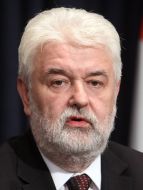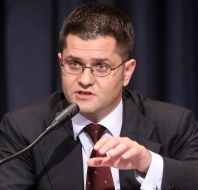Q:
A:
Serbia remains committed to preservation of its sovereignty, territorial integrity
Belgrade,
23 July 2010
Prime Minister Mirko Cvetkovic announced that the Serbian government adopted at its extraordinary session today a report by the legal team which concluded that the International Court of Justice (ICJ) has not answered the essential question of legality of the unilaterally proclaimed independence of Kosovo, and that it has not legalised the ethnically-motivated secession of the southern Serbian province.
Speaking at a press conference held after the government’s extraordinary session at which the ICJ’s advisory opinion on the legality of Kosovo’s unilaterally proclaimed independence was analysed, Cvetkovic said that the government concluded that Serbia has not received help from this court at a moment when international law has been violated at Serbia’s expense.
He stated that Serbia remains committed to the policy of the preservation of its sovereignty and territorial integrity and will use all diplomatic and political means at the nation’s disposal.
At its session today, which was also attended by Serbian President Boris Tadic, the government decided to propose to the Serbian parliament to adopt an act which would reflect the unity of all political actors when it comes to Serbia’s territorial integrity.
Cvetkovic highlighted that the Serbian government continues activities aimed at resolving the Kosovo-Metohija issue through dialogue. Serbia will keep on defending its position at the debate at the UN General Assembly, at which it will present its resolution on Kosovo. He recalled that the UN General Assembly has broad powers to discuss the Kosovo issue and Serbia remains firm in its stance that the Kosovo problem should be resolved by diplomatic and peaceful means. The Prime Minister underlined that the ICJ’s opinion on Kosovo will not jeopardise relations between Belgrade and Washington.
He remarked that the United States and Serbia have developed relations in a good direction so far and added that they have consensus when it comes to Kosovo-Metohija, and that is that they do not have agreement on this matter.
The ICJ’s advisory opinion has not changed the positions of Serbia and the United States in any sense and I do not think there could be confrontation in any way, Cvetkovic pointed out.
He stated that Serbia remains committed to the policy of the preservation of its sovereignty and territorial integrity and will use all diplomatic and political means at the nation’s disposal.
At its session today, which was also attended by Serbian President Boris Tadic, the government decided to propose to the Serbian parliament to adopt an act which would reflect the unity of all political actors when it comes to Serbia’s territorial integrity.
Cvetkovic highlighted that the Serbian government continues activities aimed at resolving the Kosovo-Metohija issue through dialogue. Serbia will keep on defending its position at the debate at the UN General Assembly, at which it will present its resolution on Kosovo. He recalled that the UN General Assembly has broad powers to discuss the Kosovo issue and Serbia remains firm in its stance that the Kosovo problem should be resolved by diplomatic and peaceful means. The Prime Minister underlined that the ICJ’s opinion on Kosovo will not jeopardise relations between Belgrade and Washington.
He remarked that the United States and Serbia have developed relations in a good direction so far and added that they have consensus when it comes to Kosovo-Metohija, and that is that they do not have agreement on this matter.
The ICJ’s advisory opinion has not changed the positions of Serbia and the United States in any sense and I do not think there could be confrontation in any way, Cvetkovic pointed out.
First Deputy Prime Minister and Minister of the Interior Ivica Dacic observed that the situation in Presevo, Bujanovac and Medvedja has been stable since the announcement of the ICJ’s opinion.
Members of the police and army are ready to respond to any incident, related not only to violation of the country’s sovereignty and territorial integrity, but also to the jeopardising of the lives and property of the local population, he declared.
The Minister stressed that the safety situation in Kosovo-Metohija is complex and that the preservation of peace, stability and safety of citizens is of vital importance not only for Serbia, but for the international community as well. Dacic recalled that in line with the UN Security Council Resolution 1244, there are no Serbian police and army in Kosovo-Metohija and it is up to the international community to secure peace and safety and prevent incidents.
He warned that any attack on Serbs in Kosovo-Metohija with the purpose of establishing the single authority of the unilaterally proclaimed state of Kosovo, which would entail the expulsion of the remaining Serbian population would be an act that could undermine peace and stability.
The Minister stressed that the safety situation in Kosovo-Metohija is complex and that the preservation of peace, stability and safety of citizens is of vital importance not only for Serbia, but for the international community as well. Dacic recalled that in line with the UN Security Council Resolution 1244, there are no Serbian police and army in Kosovo-Metohija and it is up to the international community to secure peace and safety and prevent incidents.
He warned that any attack on Serbs in Kosovo-Metohija with the purpose of establishing the single authority of the unilaterally proclaimed state of Kosovo, which would entail the expulsion of the remaining Serbian population would be an act that could undermine peace and stability.
Minister of Foreign Affairs Vuk Jeremic voiced his hope that the UN General Assembly would conclude at its session in September that the secession did not bring statehood to the Kosovo Albanians and that the solution could be found only through negotiation.
Jeremic warned that proclaiming the secession of Kosovo Albanians as legitimate would be a dangerous precedent in the world that would spur various secessionist movements.
Pandora’s box has been opened and Serbia will take an active part in the debate before the UN General Assembly. The Minister announced that he will address the Non-Aligned Movement in New York next week, pointing out that members of this Movement make up two-thirds of the UN member states. He outlined that Serbian Deputy Prime Minister Bozidar Djelic was in Uganda this week at the meeting of the African Union and added that 55 special envoys of Serbian President Boris Tadic will travel to countries around the globe to convey Serbia’s message related to Kosovo. Commenting on the ICJ’s opinion, the Minister affirmed that the ICJ decided to give a narrow and technical opinion on the declaration of Kosovo’s independence, without stating whether the secession is in line with international law. UN Security Resolution 1244 remains the only international legal means that regulates the structure of the southern Serbian province, Jeremic emphasised.
Commenting on whether Serbia would have been better off if it had put a more precise question before the ICJ, he explained that Serbia’s legal team did have debates on what question should be made, but they concluded that any other question might result in an answer that would be very unfavourable to Serbia. For example, if the question was "Did Kosovo Albanians have the right to secession", there would be a great danger that the court’s answer would be "sui generis", meaning that this is a unique case, Jeremic concluded.
Pandora’s box has been opened and Serbia will take an active part in the debate before the UN General Assembly. The Minister announced that he will address the Non-Aligned Movement in New York next week, pointing out that members of this Movement make up two-thirds of the UN member states. He outlined that Serbian Deputy Prime Minister Bozidar Djelic was in Uganda this week at the meeting of the African Union and added that 55 special envoys of Serbian President Boris Tadic will travel to countries around the globe to convey Serbia’s message related to Kosovo. Commenting on the ICJ’s opinion, the Minister affirmed that the ICJ decided to give a narrow and technical opinion on the declaration of Kosovo’s independence, without stating whether the secession is in line with international law. UN Security Resolution 1244 remains the only international legal means that regulates the structure of the southern Serbian province, Jeremic emphasised.
Commenting on whether Serbia would have been better off if it had put a more precise question before the ICJ, he explained that Serbia’s legal team did have debates on what question should be made, but they concluded that any other question might result in an answer that would be very unfavourable to Serbia. For example, if the question was "Did Kosovo Albanians have the right to secession", there would be a great danger that the court’s answer would be "sui generis", meaning that this is a unique case, Jeremic concluded.














